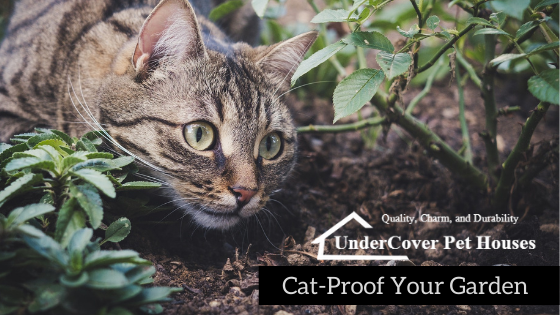 Loading... Please wait...
Loading... Please wait...Blog - Cat proof your garden
10 Ways to Cat-Proof Your Garden
Posted by Danny MacDonald on 2021 Dec 23rd

For many people, cats are one of the biggest joys in life. But having an outdoor cat can create some unique challenges when keeping your garden or backyard safe from destruction by their claws and teeth.
Here are ten tips to help you keep your garden cat-proofed so that you and your feline friend can enjoy the benefits of Mother Nature.
1) Remove Potted Plants from Patio
If you don’t want cats getting into your potted plants, keep the potted plants indoors until they’re large enough that cats won’t be able to pull them out.
2) Use Cat-safe Repellents
Outdoor cats can wreak havoc on your flower beds, shrubs, and garden crops. To keep them out of your garden, use safe cat repellents or citrus scents around your prized plants. This will help deter their visits and avoid damage.
Tip: Wear gloves when using any chemical repellent so that you don’t get any oils from your hands onto any food that may wind up as cat food later.
3) Plant Cat-safe Plants
Cats sometimes nibble at the leaves of houseplants, so if you’re thinking about starting a garden, know that some plants are toxic to cats. These include, but aren’t limited to, mistletoe, petunias, azalea, poinsettias, lilies.
Stick with cat-safe plant varieties to keep your kitty safe from garden dangers. Here’s the complete list of toxic and non-toxic plants to cats.
4) Cat Fence Off -areas
In addition to cat-proofing your garden by planting prickly plants, you can also fence off sensitive areas, such as fruit trees, vegetable beds, or busy roads. The goal is simple: deter cats from stepping on fruit or nibbling on veggies or escaping by making them uncomfortable when they do. A 6-foot fence with an overhanging wire mesh should keep most felines at bay.
5) Avoid Rodenticides
Rodenticides are extremely toxic to cats. If your cat ingests enough, it can cause kidney failure and even death. Ensure you use alternative methods to combat rodents within your household. Additionally, check that your neighbors aren’t using rodenticides to kill rodents.
6) Use Cat-safe Herbicides
You’ll want to make sure you use herbicides safely and responsibly. Carefully consider whether or not herbicides are a safe option for controlling invasive plants in your garden. Many herbicides can be harmful to your cat if they get in their paws, fur, or mouth.
If you must use herbicides, you’ll want to research any herbicide you choose before applying it outdoors. Remember that cats are extra sensitive to many chemicals.
7) Cut Down on Trash around your House
Outdoor cats can easily access your garbage and become infested with fleas, ticks, and other parasites or sickneses. They can make a mess and spread trash all over your backyard or garden. To cat-proof your outdoor trash cans, add a top or cover for your garbage can and ensure the trash is stored securely.
6) Check for Potential Hazards
As well as the tips mentioned above, check your garden for other potential hazards that may harm or endanger your cat.
These include storing tools and accessories safely, closing open or uncovered spaces like sheds where probing cats could get accidentally trapped, etc. Scout your garden and eliminate potential hazards that could endanger your cat.
The Bottom Line
Even with all their zest, it’s no secret that cats can be destructive. That’s why it’s important to cat-proof your garden, so you can still enjoy all its beauty and bounty without worrying about your cat destroying your prized plants and flowers.
